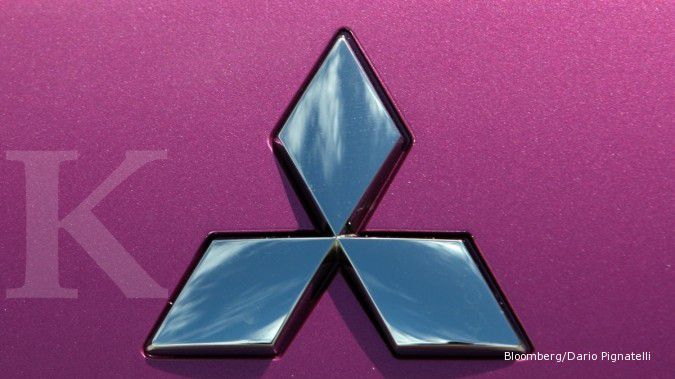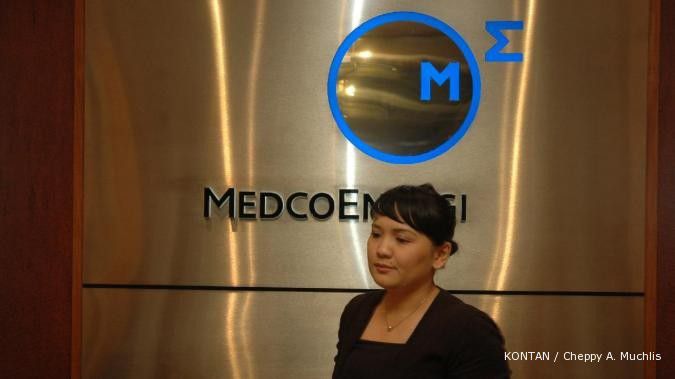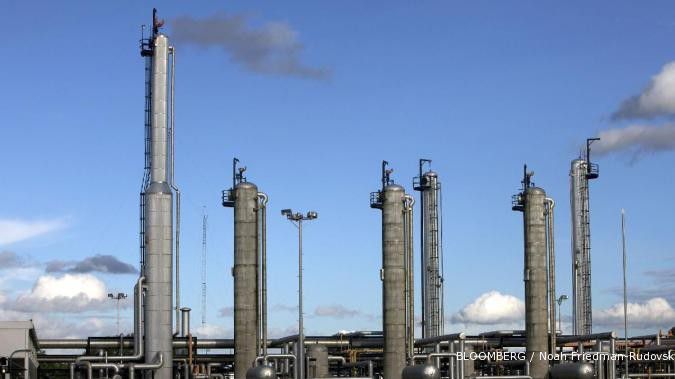LNG productionPT Donggi Senoro Liquefied Natural Gas (DSLNG) says that its liquefied natural gas (LNG) plant under construction in Donggi Senoro in Banggai, Central Sulawesi will begin commercial production in 2014 on schedule.DSLNG president director Djoko Wibowo said over the weekend that the roof of the plant’s 170,000-cubic-meter main storage tank had been installed, leaving construction of the complex 57 percent complete — and ahead of schedule.“The project is progressing 10 percent faster than planned. We will proceed mechanical work once construction is done,” Djoko said at the project site on Friday.However, Djoko said that the company would not push forward the date for the first delivery of LNG from the plant, currently scheduled for September or October 2014.“We will stick to the plan. The speedy construction gives us more time to prepare for production,” Djoko said.DSLNG has signed 13-year contracts valid until 2027 to export 1 million tons of LNG a year to Chubu Electric in Japan, 700,000 tons a year to Korea Gas Corporation (Kogas) and 300,000 tons a year to Kyushu Electric Power in Japan.Djoko said that at the government’s request, the company would also sell part of its LNG production domestically, particularly to fertilizer firms and to state-run electricity company PLN to meet high demand.Researchers at the Bandung Institute of Technology (ITB) recently suggested that the plant should allocate 335 million standard cubic feet of gas per day (mmscfd) for export, 60 mmscfd for the domestic fertilizer industry and 30 mmscfd for PT PLN.The Donggi-Senoro plant, with an estimated total production of 2.1 million tons per annum (mtpa), will be the fourth LNG plant in Indonesia after it is operational, after LNG Arun in Aceh, LNG Bontang in East Kalimantan and LNG Tangguh in Papua.Construction of the US$2.8 billion plant started in 2011, Djoko told The Jakarta Post. Up to now, construction has absorbed half of the firm’s total investment in the project.Indonesia’s largest publicly listed oil and gas company, PT Medco Energi Internasional, owns an 11.1 percent stake in the LNG plant, state oil and gas firm Pertamina holds a 29 percent stake, Japan’s Mitsubishi Corp. holds a 44.9 percent stake and Kogas a 15 percent stake.The chief of the Central Sulawesi branch of Bank Indonesia, Rahmat Hernowo, said that the project has already boosted the provincial economy. “Central Sulawesi saw a 10.25 percent jump in economic growth in 2012,” he said. The growth spurt, which followed the start of construction of the plant, topped a 9.16 percent provincial economic growth rate in 2011, and a 7.79 growth rate in 2010.The project has also employed 4,089 workers, half of them residents of Banggai regency. Indonesia is expected to produce 297 LNG cargoes in 2013, which would be 6.6 percent lower than last year’s estimated production, SKKMigas, the temporary oil and gas regulator, said.SKKMigas also said that it expected 169 LNG cargoes to be exported from Badak, 107 LNG cargoes from Tangguh and 21 from Arun. The country’s three LNG plants — Arun, Bontang and Tangguh — have a combined annual LNG production capacity of 43.9 million tons. The Jakarta Post
Donggi plant to start operation on schedule
LNG productionPT Donggi Senoro Liquefied Natural Gas (DSLNG) says that its liquefied natural gas (LNG) plant under construction in Donggi Senoro in Banggai, Central Sulawesi will begin commercial production in 2014 on schedule.DSLNG president director Djoko Wibowo said over the weekend that the roof of the plant’s 170,000-cubic-meter main storage tank had been installed, leaving construction of the complex 57 percent complete — and ahead of schedule.“The project is progressing 10 percent faster than planned. We will proceed mechanical work once construction is done,” Djoko said at the project site on Friday.However, Djoko said that the company would not push forward the date for the first delivery of LNG from the plant, currently scheduled for September or October 2014.“We will stick to the plan. The speedy construction gives us more time to prepare for production,” Djoko said.DSLNG has signed 13-year contracts valid until 2027 to export 1 million tons of LNG a year to Chubu Electric in Japan, 700,000 tons a year to Korea Gas Corporation (Kogas) and 300,000 tons a year to Kyushu Electric Power in Japan.Djoko said that at the government’s request, the company would also sell part of its LNG production domestically, particularly to fertilizer firms and to state-run electricity company PLN to meet high demand.Researchers at the Bandung Institute of Technology (ITB) recently suggested that the plant should allocate 335 million standard cubic feet of gas per day (mmscfd) for export, 60 mmscfd for the domestic fertilizer industry and 30 mmscfd for PT PLN.The Donggi-Senoro plant, with an estimated total production of 2.1 million tons per annum (mtpa), will be the fourth LNG plant in Indonesia after it is operational, after LNG Arun in Aceh, LNG Bontang in East Kalimantan and LNG Tangguh in Papua.Construction of the US$2.8 billion plant started in 2011, Djoko told The Jakarta Post. Up to now, construction has absorbed half of the firm’s total investment in the project.Indonesia’s largest publicly listed oil and gas company, PT Medco Energi Internasional, owns an 11.1 percent stake in the LNG plant, state oil and gas firm Pertamina holds a 29 percent stake, Japan’s Mitsubishi Corp. holds a 44.9 percent stake and Kogas a 15 percent stake.The chief of the Central Sulawesi branch of Bank Indonesia, Rahmat Hernowo, said that the project has already boosted the provincial economy. “Central Sulawesi saw a 10.25 percent jump in economic growth in 2012,” he said. The growth spurt, which followed the start of construction of the plant, topped a 9.16 percent provincial economic growth rate in 2011, and a 7.79 growth rate in 2010.The project has also employed 4,089 workers, half of them residents of Banggai regency. Indonesia is expected to produce 297 LNG cargoes in 2013, which would be 6.6 percent lower than last year’s estimated production, SKKMigas, the temporary oil and gas regulator, said.SKKMigas also said that it expected 169 LNG cargoes to be exported from Badak, 107 LNG cargoes from Tangguh and 21 from Arun. The country’s three LNG plants — Arun, Bontang and Tangguh — have a combined annual LNG production capacity of 43.9 million tons. The Jakarta Post





